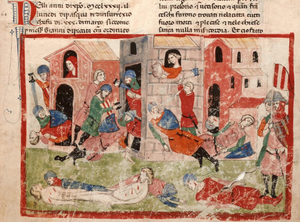| Sicilian Vespers | |||||||
|---|---|---|---|---|---|---|---|
| Part of Guelphs and Ghibellines and War of the Sicilian Vespers | |||||||
 Sicilian rebels massacre the French soldiers Nuova Cronica Vatican Library Chig.L.VIII.296 | |||||||
| |||||||
| Belligerents | |||||||
|
Sicilian faction (Staufer loyalists) |
(Angevin regime) | ||||||
| Commanders and leaders | |||||||
|
John of Procida Ruggiero Mastrangelo Bonifacio de Camerana [it] |
| ||||||
| Casualties and losses | |||||||
| 4,000 killed [1][2] | |||||||
The Sicilian Vespers (Italian: Vespri siciliani; Sicilian: Vespiri siciliani) was a successful rebellion on the island of Sicily that broke out at Easter 1282 against the rule of the French-born king Charles I of Anjou, who had ruled the Kingdom of Sicily since 1266. The revolt came after sixteen years of Angevin rule over Sicily, whose policies were deeply unpopular among the Sicilian populace.
Sparked by an incident in Palermo, the revolt quickly spread to the majority of Sicily. Within six weeks, approximately 13,000 French men and women were slain by the rebels, and the government of Charles lost control of the island. Seeking support for the rebellion, the Sicilians offered the throne to Peter III of Aragon, who claimed the crown on behalf of his wife, Constance of Sicily. The Aragonese intervention in the rebellion led to an expansion of the conflict into the War of the Sicilian Vespers.